六年级上册英语资料
六年级英语上册1-3单元知识点归纳
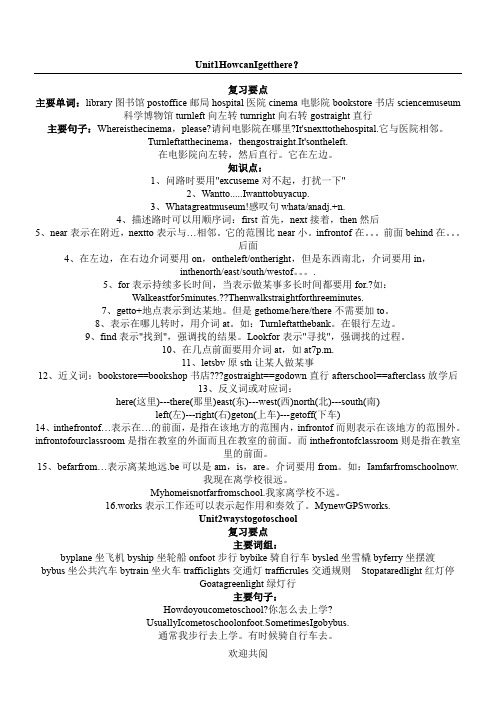
Unit1HowcanIgetthere?复习要点主要单词:library图书馆postoffice邮局hospital医院cinema电影院bookstore书店sciencemuseum 科学博物馆turnleft向左转turnright向右转gostraight直行主要句子:Whereisthecinema,please?请问电影院在哪里?It'snexttothehospital.它与医院相邻。
Turnleftatthecinema,thengostraight.It'sontheleft.在电影院向左转,然后直行。
它在左边。
知识点:1、问路时要用"excuseme对不起,打扰一下"2、Wantto.....Iwanttobuyacup.3、Whatagreatmuseum!感叹句whata/anadj.+n.4、描述路时可以用顺序词:first首先,next接着,then然后5、near表示在附近,nextto表示与…相邻。
它的范围比near小。
infrontof在。
前面behind在。
后面4、在左边,在右边介词要用on,ontheleft/ontheright,但是东西南北,介词要用in,inthenorth/east/south/westof。
.5、for表示持续多长时间,当表示做某事多长时间都要用for.?如:Walkeastfor5minutes.??Thenwalkstraightforthreeminutes.7、getto+地点表示到达某地。
但是gethome/here/there不需要加to。
8、表示在哪儿转时,用介词at。
如:Turnleftatthebank。
在银行左边。
9、find表示"找到",强调找的结果。
Lookfor表示"寻找",强调找的过程。
10、在几点前面要用介词at,如at7p.m.11、letsbv原sth让某人做某事12、近义词:bookstore==bookshop书店???gostraight==godown直行afterschool==afterclass放学后13、反义词或对应词:here(这里)---there(那里)east(东)---west(西)north(北)---south(南)left(左)---right(右)geton(上车)---getoff(下车)14、inthefrontof…表示在…的前面,是指在该地方的范围内,infrontof而则表示在该地方的范围外。
(完整版)外研版小学英语六年级上册语法知识点总结
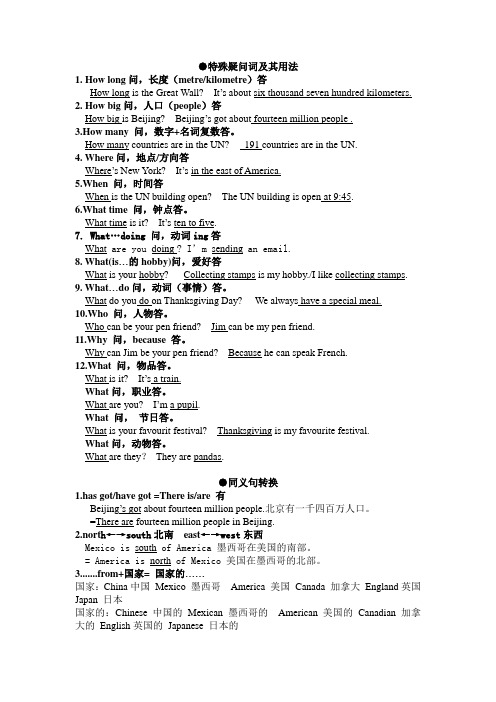
●特殊疑问词及其用法1. How long 问,长度(metre/kilometre)答How long is the Great Wall? It’s about six thousand seven hundred kilometers.2. How big 问,人口(people)答How big is Beijing? Beijing’s got about fourteen million people .3.How many 问,数字+名词复数答。
How many countries are in the UN? 191 countries are in the UN.4. Where问,地点/方向答Where’s New York? It’s in the east of America.5.When 问,时间答When is the UN building open? The UN building is open at 9:45.6.What time 问,钟点答。
What time is it? It’s ten to five.7. What…doing 问,动词ing答What are you doing ? I’m sending an email.8. What(is…的hobby)问,爱好答What is your hobby? Collecting stamps is my hobby./I like collecting stamps. 9. What…do问,动词(事情)答。
What do you do on Thanksgiving Day? We always have a special meal.10.Who 问,人物答。
Who can be your pen friend? Jim can be my pen friend.11.Why 问,because 答。
闽教版六年级英语上册知识要点汇总
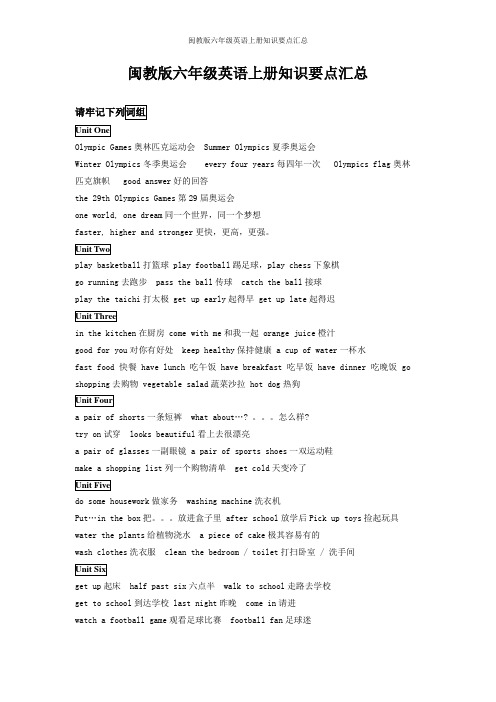
闽教版六年级英语上册知识要点汇总Olympic Games奥林匹克运动会 Summer Olympics夏季奥运会Winter Olympics冬季奥运会 every four years每四年一次 Olympics flag奥林匹克旗帜 good answer好的回答the 29th Olympics Games第29届奥运会one world, one dream同一个世界,同一个梦想faster, higher and stronger更快,更高,更强。
play basketball打篮球 play football踢足球,play chess下象棋go running去跑步 pass the ball传球 catch the ball接球play the taichi打太极 get up early起得早 get up late起得迟in the kitchen在厨房 come with me和我一起 orange juice橙汁good for you对你有好处 keep healthy保持健康 a cup of water一杯水fast food快餐 have lunch吃午饭 have breakfast吃早饭 have dinner吃晚饭 go shopping去购物 vegetable salad蔬菜沙拉 hot dog热狗a pair of shorts一条短裤 what about…? 。
怎么样?try on试穿 looks beautiful看上去很漂亮a pair of glasses一副眼镜 a pair of sports shoes一双运动鞋make a shopping list列一个购物清单 get cold天变冷了do some housework做家务 washing machine洗衣机Put…in the box把。
放进盒子里 after school放学后Pick up toys捡起玩具water the plants给植物浇水 a piece of cake极其容易有的wash clothes洗衣服 clean the bedroom / toilet打扫卧室 / 洗手间get up起床 half past six六点半 walk to school走路去学校get to school到达学校 last night昨晚 come in请进watch a football game观看足球比赛 football fan足球迷have a big family dinner办一个大的家庭晚餐Happy Thanksgiving.感恩节快乐。
小学六年级英语上册知识点整理

小学六年级英语上册知识点整理1.语法知识点- 时态:一般现在时、一般过去时、一般将来时- 句型:陈述句、疑问句、否定句、祈使句- 提问:特殊疑问词的使用(What。
Where。
When。
Why。
Who。
Whose。
How等)- 动词:动词的基本形式、动词的过去式、动词的进行时- 名词:可数名词、不可数名词、单数形式和复数形式的变化- 形容词:形容词的基本形式、形容词的比较级和最高级- 副词:副词在句中的位置- 介词:常用介词的使用(in。
on。
at。
by。
with等)- 冠词:冠词的使用(a。
an。
the)- 连词:and。
but。
or的使用2.词汇知识点- 数字:1-100的基本数字表达,以及相关的算术运算词汇- 天气:常见的天气词汇(sunny。
rainy。
windy等)- 季节:春、夏、秋、冬四个季节的英文表达- 颜色:常见的基本颜色词汇(red。
blue。
green等)- 学科:英语、数学、音乐等学科的英文表达- 动物:常见的动物名称(dog。
cat。
bird等)- 蔬菜和水果:常见的蔬菜和水果名称(carrot。
apple。
banana 等)- 地点:常见的地点名称(school。
park。
supermarket等)- 人物:常见的人物角色(teacher。
student。
friend等)3.日常用语知识点- 问候与回应:常用的问候语和回应语(Good morning。
How are you?等)- 自我介绍:自我介绍的基本句型和常用词汇- 家庭成员:家庭成员的英文表达(father。
mother。
brother等)- 个人信息:年龄、姓名、国籍等个人信息的英文表达- 时间:表达时间的基本句型和常用词汇(hour。
minute。
o'clock等)- 打电话用语的基本句型和常用词汇- 交通工具:常见的交通工具名称(bus。
car。
bike等)- 食物和饮品:常见的食物和饮品名称(rice。
六年级上册英语课本知识点总结(最新最全)
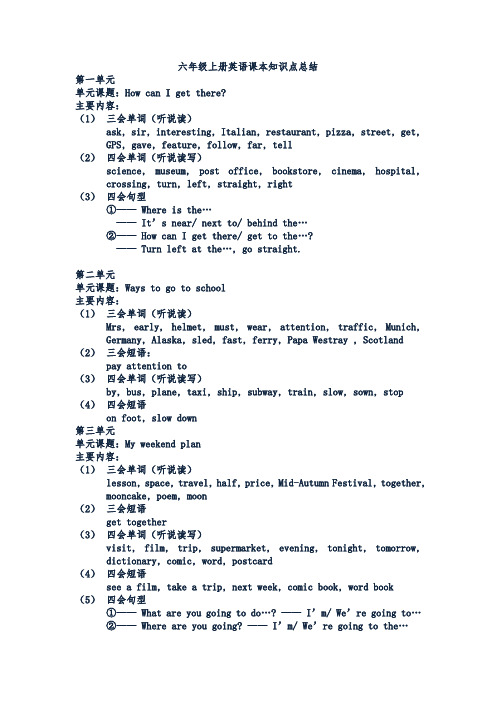
六年级上册英语课本知识点总结第一单元单元课题:How can I get there?主要内容:(1)三会单词(听说读)ask, sir, interesting, Italian, restaurant, pizza, street, get,GPS, gave, feature, follow, far, tell(2)四会单词(听说读写)science, museum, post office, bookstore, cinema, hospital,crossing, turn, left, straight, right(3)四会句型①—— Where is the…—— It’s near/ next to/ behind the…②—— How can I get there/ get to the…?—— Turn left at the…, go straight.第二单元单元课题:Ways to go to school主要内容:(1)三会单词(听说读)Mrs, early, helmet, must, wear, attention, traffic, Munich,Germany, Alaska, sled, fast, ferry, Papa Westray , Scotland (2)三会短语:pay attention to(3)四会单词(听说读写)by, bus, plane, taxi, ship, subway, train, slow, sown, stop (4)四会短语on foot, slow down第三单元单元课题:My weekend plan主要内容:(1)三会单词(听说读)lesson, space, travel, half, price, Mid-Autumn Festival, together, mooncake, poem, moon(2)三会短语get together(3)四会单词(听说读写)visit, film, trip, supermarket, evening, tonight, tomorrow,dictionary, comic, word, postcard(4)四会短语see a film, take a trip, next week, comic book, word book(5)四会句型①—— What are you going to do…? —— I’m/ We’re going to…②—— Where are you going? —— I’m/ We’re going to the…③— When are you going? ——(时间)第四单元单元课题:I have a pen pal主要内容:(1)三会单词(听说读)pen pal, hobby, jasmine, idea, Canberra, amazing, shall, goal, join, club, share(2)四会单词(听说读写)studies, puzzle, hiking(3)四会句型①—— What is ×××’s hobby? —— He/ She likes doing sth.②—— What are ×××’s hobbies?—— He/ She like doing, doing and doing sth.③—— Does he/ she…—— Yes, he/ she does. No, he/ she doesn’t.(4)重点语法点①动词的-ing形式,即like doing sth.表达喜欢做某事。
六年级上册英语复资料

六年级上册英语复资料以下是六年级上册英语复习资料,包括一些重点词汇、短语和句子,以及一些常见的语法知识点。
重点词汇:1. subject 科目2. math 数学3. science 科学4. social studies 社会研究5. English 英语6. Chinese 语文7. music 音乐8. art 美术9. physical education 体育10. library 图书馆常见短语:1. have a good day 过得愉快2. see you later 待会儿见3. have a good time 过得开心4. let me know 让我知道5. have a look 看一看6. have a seat 请坐7. what about you 你呢8. I don’t know 我不知道9. I think so 我认为如此10. I’m not sure 我不能确定常见句子:1. What’s your favorite subject? 你最喜欢的科目是什么?2. I like math because it’s fun. 我喜欢数学因为它很有趣。
3. Do you like science? 你喜欢科学吗?4. Yes, I do. 是的,我喜欢。
5. No, I don’t. 不,我不喜欢。
6. What’s your favorite sport? 你最喜欢的运动是什么?7. My favorite sport is basketball. 我最喜欢的运动是篮球。
8. When do you usually get up? 你通常什么时候起床?9. I usually g et up at 7 o’clock. 我通常在7点钟起床。
10. How many hours do you sleep every night? 你每晚睡多少小时?语法知识点:1. 现在进行时:表示正在进行的动作或状态,结构为“be动词+动词ing”。
六年级英语上册期末复习资料
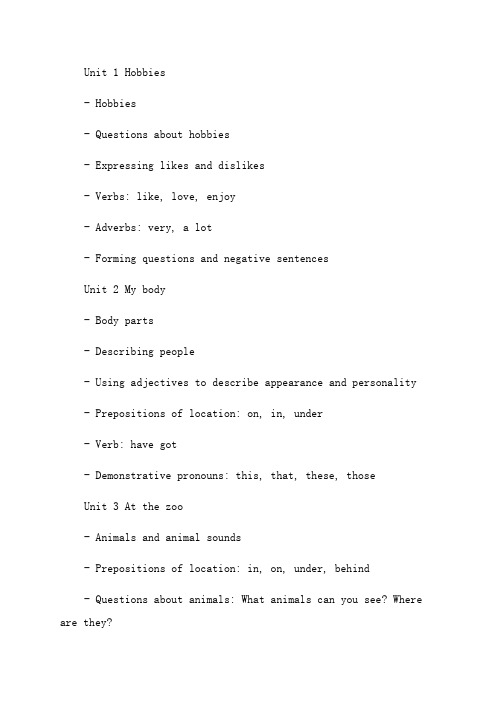
Unit 1 Hobbies- Hobbies- Questions about hobbies- Expressing likes and dislikes- Verbs: like, love, enjoy- Adverbs: very, a lot- Forming questions and negative sentencesUnit 2 My body- Body parts- Describing people- Using adjectives to describe appearance and personality - Prepositions of location: on, in, under- Verb: have got- Demonstrative pronouns: this, that, these, thoseUnit 3 At the zoo- Animals and animal sounds- Prepositions of location: in, on, under, behind- Questions about animals: What animals can you see? Where are they?- Adjectives: big, small, tall, short, long, thin, fat- Singular and plural nouns- Affirmative and negative sentencesUnit 4 At school- School subjects- Classroom objects- Actions: read, write, draw, play, sing, dance, swim, run - Expressing ability: Can you…? Yes, I can. / No, I can’t.- Expressing permission: Can I…? Yes, you can. / No, you can’t.- Ordinal numbers: first, second, third, etc.Unit 5 My house- Rooms in a house- Furniture and household objects- Prepositions of location: in, on, under, behind, next to, in front of- Questions about rooms and furniture: Is there a…? Are there any…?- There is / There are- Adjectives: big, small, old, new, clean, dirtyUnit 6 At the park- Activities at the park: walk, run, play, ride, climb, swing, slide- Prepositions of location: in, on, under, behind, in front of, next to- Questions about activities: What can you do at the park? Where can you…?- Expressing preferences: I prefer… / I don’t like…Unit 7 In the mountains- Geographical features: mountain, river, lake, valley- Activities in the mountains: hike, climb, swim, fish, take photos- Prepositions of location: in, on, under, behind, in front of, next to- Questions about activities: What can you do in the mountains? Where can you…?- Verb: can- Expressing preferences: I prefer… / I don’t like…Unit 8 In Beijing- Places in Beijing: the Great Wall, the Forbidden City, Tiananmen Square- Activities in Beijing: visit, walk, take photos, climb, buy souvenirs- Prepositions of location: in, on, under, behind, in front of, next to- Questions about places and activities: What can you do in Beijing? Where can you…?- Modal verb: can- Expressing preferences: I prefer… / I don’t like…Unit 9 Food and drinks- Food and drinks- Expressing likes and dislikes about food and drinks- Countable and uncountable nouns- Quantifiers: a glass of, a cup of, a bowl of, some- Adjectives: hot, cold, sweet, salty, sour, delicious, tastyUnit 10 Favourite sports- Sport names- Expressing likes and dislikes about sports- Sports equipment- Questions about sports: What sports do you like? What sports can you play?- Verbs: play, do- Expressing abilities: I can… / I can’t…Unit 11 Time for fun- Months and seasons- Expressing likes and dislikes about activities in different seasons- Ordinal numbers: first, second, third, etc.- Adjectives: sunny, cloudy, rainy, snowy, cold, hot, warm, cool- Present simple tense: I read/write/draw…Unit 12 Holidays- Holidays and holiday activities- Questions about holidays: What holiday is in…? What can you do during…?- Adjectives: long, short, fun, boring, interesting- Expressing future plans: I am going to… I will…- Expressing preferences: I prefer… / I don’t like…总结:这个提纲包含了人教版六年级上册所有的重点内容,可以帮助学生复习整个上学期所学的知识点。
冀教版六年级英语上册各单元知识点汇总
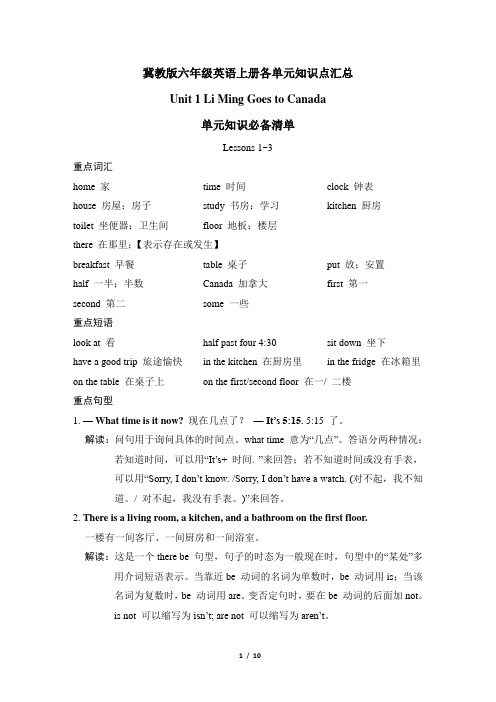
冀教版六年级英语上册各单元知识点汇总Unit 1 Li Ming Goes to Canada单元知识必备清单Lessons 1~3重点词汇home 家time 时间clock 钟表house 房屋;房子study 书房;学习kitchen 厨房toilet 坐便器;卫生间floor 地板;楼层there 在那里;【表示存在或发生】breakfast 早餐table 桌子put 放;安置half 一半;半数Canada 加拿大first 第一second 第二some 一些重点短语look at 看half past four 4:30 sit down 坐下have a good trip 旅途愉快in the kitchen 在厨房里in the fridge 在冰箱里on the table 在桌子上on the first/second floor 在一/ 二楼重点句型1. — What time is it now?现在几点了?—It’s 5:15. 5:15 了。
解读:问句用于询问具体的时间点。
what time 意为“几点”。
答语分两种情况:若知道时间,可以用“It’s+ 时间. ”来回答;若不知道时间或没有手表,可以用“Sorry, I don’t know. /Sorry, I don’t have a watch. (对不起,我不知道。
/ 对不起,我没有手表。
)”来回答。
2. There is a living room, a kitchen, and a bathroom on the first floor.一楼有一间客厅、一间厨房和一间浴室。
解读:这是一个there be 句型,句子的时态为一般现在时,句型中的“某处”多用介词短语表示。
当靠近be 动词的名词为单数时,be 动词用is;当该名词为复数时,be 动词用are。
变否定句时,要在be 动词的后面加not。
is not 可以缩写为isn’t; are not 可以缩写为aren’t。
- 1、下载文档前请自行甄别文档内容的完整性,平台不提供额外的编辑、内容补充、找答案等附加服务。
- 2、"仅部分预览"的文档,不可在线预览部分如存在完整性等问题,可反馈申请退款(可完整预览的文档不适用该条件!)。
- 3、如文档侵犯您的权益,请联系客服反馈,我们会尽快为您处理(人工客服工作时间:9:00-18:30)。
Module 1 Unit 1 The Great Wall 学习任务:These postcards are great! It’s a picture of the Great Wall . 功 能: 讲述关于某个地方或某件事物的情况。 重点句型 1. These postcards are great . 2. It’s a picture of the Great Wall . 3. How long is the Great Wall ? It’s about six thousand seven hundred kilometers . 4. How big is Beijing ? It has got eight million people .
Unit 2 New York is in the east of America . 学习任务:Where is New York ? It’s here, in the east . Canada is north of America and Mexico is south of America. 功 能: 讲述某地的地理位置和相关的基本信息。 America New York san Francisco Canana Mexico China 带领学生学习表达地理位置的方法。 Where is New York ? It’s in the east of America . What about San Francisco ? It’s in the west of America.
Module 2 教学内容:Unit 1 Chinatown in America. 学习任务: There is a Chinatown in New York! There are lots of Chinese shops and restaurants there. 功能:用 "There be “句型描述事物。 1. I’m sending an email to my family in China . 2.Do you want to go to China town? 3.There is a Chinatown in New York. 4. There are lots of Chinese shops and restaurants there . 5. There is Chinese dancing.
教学内容:Unit2 Postcards from China 学习内容:There are lots of bicycles in China . There is a very famous river. 功能: 用“There be”句型介绍事物。 Look! These are my postcards from China .Look at this one .There are lots of bicycles in China . People ride them to work . And there are lots of beautiful lakes. This is the west lake. It’s in Hangzhou. There is a very famous river ,the Changjiang River .It is about 12,600 li long . I like this postcard .There is a famous square in the middle of Beijing . It’s Tian’anmen Square . And there’s a very famous wall in China ,the Great Wall. It’s six thousand seven hundred kilometers long . Of course , there are also many mountains in China . There is a famous mountain in Anhui . Look ! This is the Huangshan Mountain .
Module 3 第一课时 教学内容:Unit 1 Collecting stamps is my hobby. 学习任务:I’ve got lots of stamps . These are some stamps from Canana. This stamp is from China . 功 能:谈论和介绍个人的爱好。 导入“What’s your favourite sport /game /food ? My favourite sport / games /food is ┅ 或 Do you like ┅ Yes ,I do . /No ,I don’t. 1、重点句型:Collecting stamping is my hobby . Have you got any stamps from China ? Yes ,I have . /No ,I haven’t. There is /are Is /Are there ?
教学内容:Unit 2 I’ve got a hobby . 学习任务:Have you got any dolls from Japan ? Yes ,I have . / No ,I haven’t. 功 能:自由谈论自己的爱好或询问他人的爱好。 师生进行对话练习,询问学生的兴趣爱好:What do you like ? I like ┅ Have you got any ┅? Yes ,I have ./ No ,I haven’t. Do you collect ┅? Girl 1:I collect dolls . Teacher: Oh, Have you got any dolls from Japan ? Girl 1: No ,I haven’t . but I’ve got some dolls from china . Teacher :Oh ,they’re beautiful . Boy 1: Reading is my hobby . I’ve got lots of story books . Teacher :Have you got any picture books . Boy 1: No ,I haven’t Boy 2 :Flying kites is my hobby . Look .I have got some Chinese kites . Teacher :Have you got any dragon kites? Boy 2 : Yes ,this is a dragon kite . Girl 2: I like riding my bicycle . that’s my hobby . Teacher :Have you got any photos of your bike ? Girl2: Yes ,these are some photos of my new bike .
Module 4 第一课时 教学内容: Unit 1 Happy Thanksgiving ! 学习任务: Thanksgiving is my favourite festival. We always have a special meal . We say “thank you ”for our food, family and friends. 功能:谈论和描述感恩节等西方节日。
教学内容:Unit 2 What’s your favourite festival ? 学习任务:What’s your favourite festival? My favourite festival is Lantern Festival . 功 能:介绍中国主要节日。 比较中西方节日的差异。 交流自己对节日的喜好。 Girl1: I love this festival . we all go to see the Dragon Boat race ,We eat zongzi . It’s very delicious . Boy 1: My mother loves this festival . She makes mooncakes . Her cakes are delicious , my father likes this festival , too . He sings moon songs . His songs are very good . Girl 2: This is my family . Our favourite festival is the Spring Festival , we have a special family dinner . and we eat jiaozi . Boy 2: My favourite festival is after spring festival . It’s at night . there are lots of lanterns and there’s a dragon dance .
Module 5 教学内容:Unit 1 pleased to meet you ! 学习任务:Can you speak English? Can I write to your friend ? 功能:讲述自己的能力。 通过介绍自己的情况结识笔友或网友。 Where is Laura from? How many English friends has Daming got ? Can Laura write Chinese ? Can Daming write English? Can they be pen friends ?
教学内容:Unit 2 Pen Friends 学习任务:Who can be your pen friend ? He can speak French. 功能:讲述能力。 根据自己的兴趣和爱好结交笔友或网友。 Mike :hi ,I’m Mike .i’m eleven and I’m from Sydney . I like football and swimming . Yao Tingting : My name is Yao Tingting . I’m form Hong Kong .i can write emails and stories in English . I like drawing and playing computer games. Jim: hello, I’m Jim from London . I’m twelve. I can speak French and English , of course ! I like music and collecting stamps. Linda: Hi ,I’m from san Francisco and my name’s Linda . I can speak English and Chinese . I like dancing . painting and I love my pet dog, Alex. 3、问学生:Who can be your pen friend ? Why ? 5、 两人一组互相问答,运用以下语言: Who can be your pen friend ? Linda can . Why ? Linda loves her pet dog, and I love my dog , too. Linda is American and I want to learn English from her .
